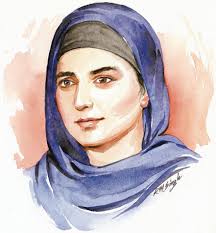AGYA KAUR. BIBI (d. 1918), wife of Bhai Takht Singh and his helpmate in promoting women\’s education among Sikhs to which cause he was passionately devoted, was the daughter of Sardar Tek Singh of the village of Sultanpur, near Rahim Yar Khan railway station in the princely state of Bahawalpur. She had been a resident student at the Sikh girls school, at Firozpur, founded in 1892 and nurtured by Bhai Takht Singh. Agya Kaur had studied at the Mahavidyala up to the high school level. Bhai Takht Singh\’s first wife Harnam Kaur who was a co-builder of the school died in 1906.
He approached Agya Kaur\’s father to ask for her hand to be his ally in the enterprise he had launched upon.The nuptials took place at Sultanpur on 17 September 1910. On 1617 February 1911, Bibi (lady) Agya Kaur left with her husband on a tour of some South Asian countries to raise funds for the school. At Sikh gatherings and at divans at the gurdwaras, she recited holy hymns, kirtan, and made fervent appeals for donations, for their nascent school.
Returning to Punjab on 3 March 1912, she resumed her duties at the Mahavidyala as a teacher and as a matron of the hostel. She was taken ill with influenza during the epidemic of 1918, aggravated in her case by an attack of pneumonia. She died on 27 October 1918. She left behind four children, one other daughters rising to the position of Director of Public Instruction in Punjab.
References :
1. PanjabiBhain. Firozpur, September 1910 and December 1918
2. Silver Jubilee Book. Amritsar, 1935
Agya Kaur: Pioneer in Sikh Women’s Education, a trailblazing figure whose contributions helped shape the course of educational opportunities for Sikh women in the early 20th century.
Early Life and Formation of Educational Aspirations
Agya Kaur, also affectionately known as Bibi Agya Kaur, was born into a family of influence in the princely state of Bahawalpur. As the daughter of Sardar Tek (or Nek) Singh of Sultanpur—located near the Rahim Yar Khan railway station—she received a solid early education. A resident student at the Sikh girls school in Firozpur, which was founded in 1892 and nurtured by visionary reformers, Agya Kaur not only benefited from but also absorbed the values of academic pursuit and empowerment. Her academic journey, notably advancing up to the high school level at the Mahavidyala, kindled a lifelong commitment to learning and to the transformative potential of education for women.
Partnership in Educational Reform
Agya Kaur’s path took a defining turn when Bhai Takht Singh, a passionate advocate for women’s education and the co-builder of the Sikh girls’ school, selected her as his partner—both in life and in his educational endeavors. Following the passing of his first wife, Harnam Kaur, who had also contributed significantly to the school’s development, Bhai Takht Singh approached Agya Kaur’s family to form a new alliance that would further the cause of educating Sikh women. Their nuptials on 17 September 1910 marked the beginning of a powerful collaboration dedicated to uplifting educational standards and cultural awareness among Sikh women.
Advocacy and Fundraising on the National Stage
Embodying both grace and resolve, Agya Kaur embraced her role as a reformer and educator. In a remarkable display of leadership, on 17 February 1911, she and her husband embarked on a tour spanning several South Asian countries with the express purpose of raising funds for their nascent school. At various Sikh gatherings and in divans at gurdwaras, Agya Kaur passionately recited holy hymns and kirtan, skillfully appealing for donations to support the educational infrastructure they championed. Her public engagements not only heightened the visibility of the cause but also helped galvanize a community-wide response in favor of educational reform.
Contributions in the Classroom and Beyond
After an extensive fundraising tour, Agya Kaur returned to the Punjab on 3 March 1912 reinvigorated and deeply committed to her dual roles as a teacher and a matron of the school hostel. At the Mahavidyala, her nurturing presence and exemplary conduct provided both academic instruction and a moral framework for young Sikh women. Through these endeavors, Agya Kaur not only facilitated access to formal education but also instilled values of self-respect and social responsibility—qualities that would have a lasting impact on her students and on future generations.
Legacy and Enduring Influence
Tragically, during the influenza epidemic of 1918—compounded by pneumonia—Agya Kaur’s life was cut short on 27 October 1918. Yet, her legacy endures through the institutions she helped build and the lives she touched. Among her four children, one daughter rose to the position of Director of Public Instruction in Punjab, underscoring how Agya Kaur’s influence extended well beyond her lifetime. Her pioneering efforts in promoting women’s education have come to symbolize both the potential and the necessity of empowering women through learning, and her work remains an inspirational chapter in the broader narrative of educational reform within the Sikh community.
Agya Kaur’s life is a testament to the transformative impact that dedicated educators can have on society. Her pioneering role in founding and expanding educational opportunities for Sikh women helped lay the groundwork for future reform initiatives, ensuring that the legacy of empowerment through education shines brightly even today.



